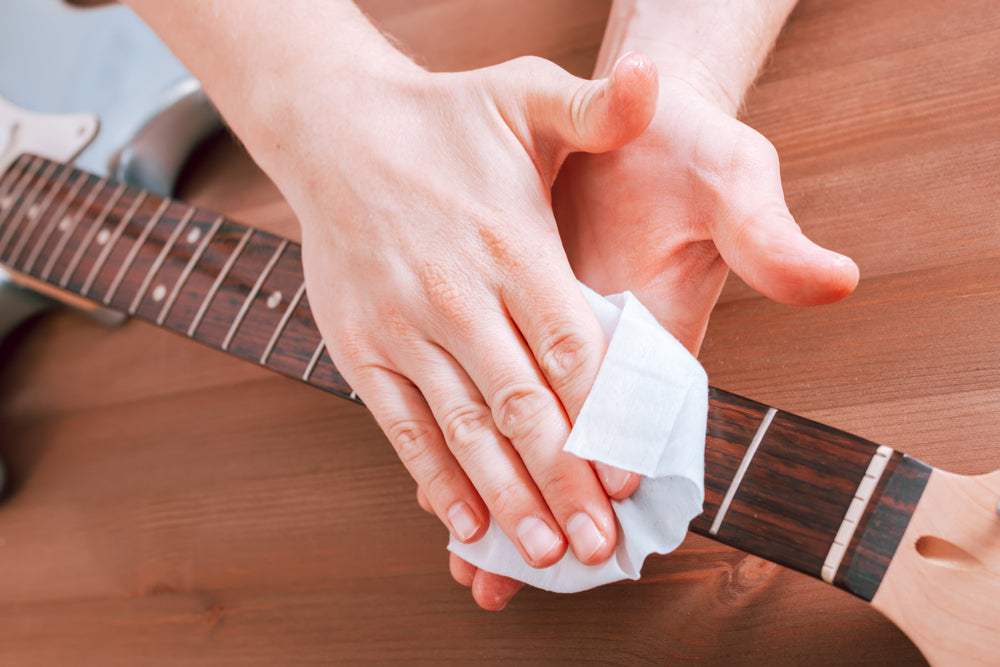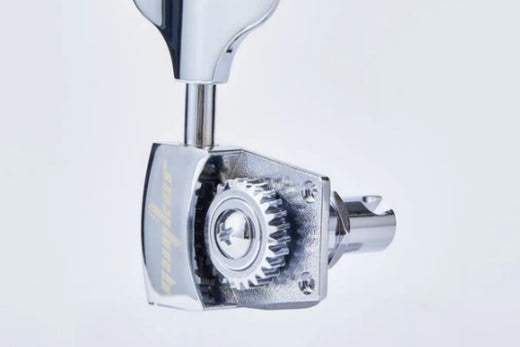This is the ultimate guide for you to learn how to clean guitar strings at home. I’ll guide you through the methods, the products, and the best insider tips to enjoy your guitar strings at their best for the longest time.
Are you ready? Well, let’s do it!
How to Clean Guitar Strings
If the question. “Can you clean guitar strings?” Ever came to mind, then you’re in the right place because the answer is yes. Not only you can but you also should. Yet, before we go deep into the topic of studio and live use, let’s get into an everyday solution that’ll help you extend your strings’ usable life a lot.
Cleaning Strings Every Day
Let me teach you how to clean guitar strings after playing because this is the best way to avoid greasy guitar strings. Furthermore, you need to learn how to clean the gunk off guitar strings before it becomes too thick of a layer and kills your strings’ tone.
Follow these simple steps:
1. You can think of this as step minus one because the step is washing your hands before playing. You should do this every time without exceptions.
2. After every gig clean each string with a dry cloth. Make sure you wrap the entire string, wiping the grime from underneath.
3. Use the same cloth to wipe the strings clean and remove sweat from the fretboard. Wrap the six strings from below as well as from the top part. Then move it from the nut to the bridge.
In case you’re looking for info about how to clean your acoustic guitar strings, don’t worry, follow the same advice and make sure you do it after playing every time.
Cleaning the Strings for Studio and Live Use
I’ve been in this scenario countless times before. Perhaps your guitar sounds good, the strings are still working great, but they don’t look shiny and new. Or you need to pull out a guitar for a single gig and it sounds good, but the strings are rusty because guess what? Yes, you forgot to wipe them clean the last time you played it.
Well, I’m about to teach you how to clean guitar strings rust so they’ll look fresh and new (but are the ones you’ve been playing with the last couple of weeks). You need to apply a string-cleaning product to them. There are plenty of choices in the market right now.
First, put something over your fretboard to protect it from the liquid going on the strings.
Second, apply the product of your choice straight to the strings. Alcohol is something many people advise as a cleaner. Although it will get the job done by cleaning the strings, it’s a solvent. It might interact with your guitar’s lacquer eating it away.
This is also the best way to clean bass guitar strings.
Some people say you should boil them, in fact, there’s a tale of Eddie Van Halen doing it. Well, you can try that, but prevention wiping them every day and these tips should be enough to squeeze the last good-sounding tone from those strings.
What Kind of Products Do You Need?
There are many brands out there claiming they’ve found the best solution for your guitar strings. Let me try to answer the question, “What do you use to clean guitar strings?” for you.
Perhaps, the most famous guitar string cleaning product is the GHS Fast Fret. It’s been around for decades. But is it the only way to go? Well, the answer is no, because Dunlop and many other brands entered the market lately with great products.
My advice is to try them all.
Let me warn you about one thing, though. If you’re learning how to clean classical guitar strings, which are made of nylon or derivates, make sure the liquid won’t interact negatively with the material. You could achieve the opposite goal shortening your strings’ lifespan.
Don’t Go DIY
Learning how to clean guitar strings with household products might seem like a good choice. After all, many sites claim they can teach you how to clean guitar strings with vinegar or to clean guitar strings with alcohol.
Well, strings aren’t so much the issue with these methods. The problem is the fretboard beneath. Alcohol and vinegar might interact negatively with the neck’s finish. If that happens, you’ll be saving money on strings while diminishing the resale price of your instrument.
Furthermore, if you’re trying to learn how to clean coated guitar strings, this advice is especially for you. If you clean guitar strings with vinegar or alcohol, the solvents might eat away your strings’ coating material.
When Is It Time to Change the Strings?
You can learn how to clean rusty strings on a guitar but there comes a time you have to face the end and buy new strings for your guitar. Here are the three symptoms I use as a guide.
• The Strings Sound Dead – Guitar strings are made to produce a specific tone. Eventually, that tone starts to die out. Suddenly, treble response is limited and the bottom-end doesn’t sound tight anymore. You’ve done your best but those strings are killing your instrument and need to be replaced.
• You Break a String – Whenever I break a string playing naturally, I know I have to change all the strings on that guitar. This is because when a string gives up, the rest of the strings might be on the verge of breakage. Therefore, I prefer not to play with that risk while playing live or during studio sessions.
• They Can’t Keep the Tuning – Another very common symptom of a string needing replacement is that they can’t keep the tuning. This is because they’re just too stretched and move too much. Well, that’s not something you can repair, so it’s time for a new set to go in.
The Bottom Line
Learning how to clean guitar strings is a must if you want to keep your guitar sounding and feeling at its best without changing the strings so often.
Following the advice above, you will not only extend the lifespan of the strings but also take better care of the fretboard. Remember, saving some dollars on strings and investing in applying another coat of lacquer to your neck because of the cleaning liquid isn’t the way to go.
Happy (clean and comfortable) guitar playing!
If you like this article, please share it!
Be sure to join our FB Group Guyker Guitar Parts VIP Group to share your ideas! You can also have connections with like-minded guitar players, Guyker updates as well as discounts information from our FB Group.




